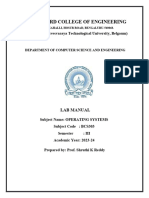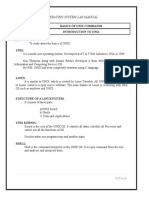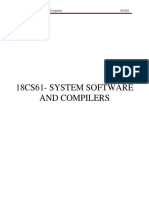OSFileLess
Uploaded by
DreadcoreOSFileLess
Uploaded by
DreadcoreEXPERIMENT 1
Aim-: Study of hardware and software requirements of different operating
systems(UNIX, LINUX, WINDOWS XP, WINDOWS7/8.
OPERATING SYSTEM
An operating system acts as an interface between the software and different parts of the computer or
the computer hardware. The operating system is designed in such a way that it can manage the overall
resources and operations of the computer. It is a fully integrated set of specialized programs that handle
all the operations of the computer.
TYPES OF OPERATING SYSTEM
● Windows
● Linux
● Unix
COMPARATIVE ANANYSIS OF VARIOUS OS
Parameters Windows Linux Unix
Cost Less Costly Free More Costly
Ease of use Easy to use Littly difficult for first Easy to use
time user
Security More prone to attack More vulnerable than Less prone to attacks
Unix but less than
Windows
Gaming More games are Less games are present Less games are present
present.
Development and Developed and Linux is open sourced Most of Unix system are
Distribution distributed by Microsoft and distributed by developed by AT&T with
various vendors other commercial
vendors and non profit
organization.
Operating System Lab(KCS-451) Prashant Yadav 2100910100131
ADVANTAGES AND DISADVANTAGES OF VARIOUS OPERATING SYSTEM
1. WINDOWS
Advantages
● User friendly interface and easy to use
● Compatible to all hardware
● Support plug and play feature
● Provide software Development support
● Have both Desktop and touch screen support
Disadvantages
● Security Concerns
● Paid software
● Infection assults
● Rebooting a framework
● High Performance System Required
2. LINUX
Advantages
● Open Source
● No antivirus software needed
● Low system specifications
● No reboot needed for installing/uninstalling
● Less disk space needed
Operating System Lab(KCS-451) Prashant Yadav 2100910100131
Disadvantages
● Software compatibility
● Gaming
● Limited software Availability
● Hardware Compatibility
● Learning curve
3. UNIX
Advantages
● Very stable
● Less code to execute
● Ideal for web hosting
● Safe and secure
● Multitasking
Disadvantages
● Not user friendly
● Cryptic commands
● Gaming
● Less softwares are available
● Software Compatibility
HARDWARE AND SOFTWARE MINIMUM REQUIREMENTS
Operating System Lab(KCS-451) Prashant Yadav 2100910100131
1 WINDOWS 10
● Processor: 1 Gigahertz (GHz) or faster processor.
● RAM: 1 gigabyte (GB) for 32-bit OS or 2GB for 64-bit OS.
● Hard disk Space: 16 Gb for 32-bit OS or 20GB for 64-bit OS.
2 Windows XP
● Pentium 233 MHz processor or faster.
● At least 64 MB of RAM (128 MB is recommended).
● At least 1.5 GB of available space.
3 LINUX
● 32-bit Intel-compatible processor running at 2GHz or greater.
● 512 MB RAM
● Disk space- 2.5 Gb for pipeline Pilot server plus components
● A DVD –ROM drive
4 UNIX
● RAM:1 GB
● Processor: IBM 604e processor with a clock speed of 375 MHz or faster
● Disk space: 1GB free disk space
EXPERIMENT 2
Operating System Lab(KCS-451) Prashant Yadav 2100910100131
Aim-: Execute various UNIX system calls for
i. Process management
ii. File management
iii. Input/output Systems calls
COMMONLY USED UNIX SYSTEM CALLS FOR PROCESS MANAGEMENT:
● fork(): Creates a new process by duplicating the existing process.
● wait(): Suspends the execution of the current process until one of its child processes terminates.
● waitpid(): Suspends the execution of the current process until a specific child process
terminates.
● waitid(): Suspends the execution of the current process until a specific child process or group of
child processes terminates.
● exit(): Terminates the current process and returns the exit status to the parent process.
● kill(): Sends a signal to a specified process.
● getpid(): Returns the process ID (PID) of the current process.
● getppid(): Returns the PID of the parent process of the current process.
● getpgrp(): Returns the process group ID of the current process.
● setpgid(): Sets the process group ID of a process.
● setsid(): Creates a new session and sets the process group ID.
● nice(): Modifies the priority of a process.
● setpriority(): Sets the priority of a process.
● getpriority(): Gets the priority of a process.
● sched_yield(): Yields the processor to other processes.
● getrusage(): Gets resource usage statistics for the current or child processes.
● times(): Gets the current process and system times.
● getrlimit(): Gets the resource limits for the current process.
● setrlimit(): Sets the resource limits for the current process.
COMMONLY USED UNIX SYSTEM CALLS FOR FILE MANAGEMENT:
● open(): Opens a file or creates a new file if it doesn't exist.
Operating System Lab(KCS-451) Prashant Yadav 2100910100131
● close(): Closes a file descriptor.
● read(): Reads data from a file.
● write(): Writes data to a file.
● lseek(): Changes the file offset (position) within a file.
● unlink(): Deletes a file.
● rename(): Renames a file.
● chmod(): Changes the permissions of a file.
● chown(): Changes the owner and group of a file.
● mkdir(): Creates a new directory.
● rmdir(): Deletes an empty directory.
● opendir(): Opens a directory for reading.
● readdir(): Reads the next directory entry.
● closedir(): Closes a directory.
● link(): Creates a hard link to a file.
● symlink(): Creates a symbolic (soft) link to a file.
● readlink(): Reads the value of a symbolic link.
● chdir(): Changes the current working directory.
● getcwd(): Gets the current working directory.
COMMONLY USED UNIX SYSTEM CALLS FOR INPUT/OUTPUT SYSTEM
CALL:
● open(): Opens a file or creates a new file if it doesn't exist.
● close(): Closes a file descriptor.
● read(): Reads data from a file descriptor.
● write(): Writes data to a file descriptor.
● ioctl(): Performs device-specific input/output operations (e.g., configuring a serial port).
● select(): Monitors multiple file descriptors for read/write/exception events.
● poll(): Polls multiple file descriptors for events.
● recv() and send(): Receives and sends data over a network socket.
● socket(): Creates a new network socket.
● bind(): Associates a socket with a local address.
● listen(): Puts a socket into a passive listening mode.
Operating System Lab(KCS-451) Prashant Yadav 2100910100131
● accept(): Accepts an incoming network connection on a listening socket.
● connect(): Initiates a connection to a remote network address.
● shutdown(): Shuts down all or part of a network connection.
● pipe(): Creates an interprocess communication (IPC) pipe.
● dup() and dup2(): Duplicates a file descriptor.
● fsync(): Flushes changes to a file to disk.
● ftruncate(): Truncates a file to a specified size.
● pread() and pwrite(): Reads and writes data at a specific offset within a file.
EXPERIMENT 3.1
Operating System Lab(KCS-451) Prashant Yadav 2100910100131
Aim-: Implement FCFS CPU Scheduling:
PROGRAM
#include <stdio.h>
int main()
{ int i,n;
printf("p no.= process number\t at=arrival time\t bt=Burst time\t ct=Completion time\t tat=Turn
around time\t wt=waiting time\n");
printf("enter total number of process = ");
scanf("%d",&n);
int p[15];
int at[15];
int bt[15];
printf("enter the arrival time in sorted order\n");
for(i=1;i<(n+1);i++)
printf("enter arrival time of p%d = ",i);
scanf("%d",&at[i]);
for(i=1;i<(n+1);i++)
printf("enter Burst time of p%d = ",i);
scanf("%d",&bt[i]);
int ct[15];
ct[0]=0;
for(i=1;i<(n+1);i++)
Operating System Lab(KCS-451) Prashant Yadav 2100910100131
ct[i]=ct[i-1]+bt[i];
int tat[15];
for(i=1;i<(n+1);i++)
tat[i]=ct[i]-at[i];
int wt[15];
for(i=1;i<(n+1);i++)
wt[i]=tat[i]-bt[i];
float avgtat,avgwt;
avgtat=0.0;
avgwt=0.0;
for(i=1;i<(n+1);i++)
avgtat=avgtat+tat[i];
for(i=1;i<(n+1);i++)
avgwt=avgwt+wt[i];
avgtat=avgtat/n;
avgwt=avgwt/n;
printf("p no.\tat\tbt\tct\ttat\twt\n");
for(i=1;i<(n+1);i++)
Operating System Lab(KCS-451) Prashant Yadav 2100910100131
printf("p%d\t%d\t%d\t%d\t%d\t%d\n",i,at[i],bt[i],ct[i],tat[i],wt[i]);
printf("average Turn around time:%f\n",avgtat);
printf("average Waiting time:%f",avgwt);
return 0;
OUTPUT
EXPERIMENT 3.2(a)
Aim-: Implement SJF CPU Scheduling:
Operating System Lab(KCS-451) Prashant Yadav 2100910100131
SJF SCHEDULING
PROGRAM
#include<stdio.h>
int main() {
int time, burst_time[10], at[10], sum_burst_time = 0, smallest, n, i;
int sumt = 0, sumw = 0;
printf("enter the no of processes : ");
scanf("%d", & n);
for (i = 0; i < n; i++) {
printf("the arrival time for process P%d : ", i + 1);
scanf("%d", & at[i]);
printf("the burst time for process P%d : ", i + 1);
scanf("%d", & burst_time[i]);
sum_burst_time += burst_time[i];
burst_time[9] = 9999;
for (time = 0; time < sum_burst_time;) {
smallest = 9;
for (i = 0; i < n; i++) {
if (at[i] <= time && burst_time[i] > 0 && burst_time[i] < burst_time[smallest])
smallest = i;
printf("P[%d]\t|\t%d\t|\t%d\n", smallest + 1, time + burst_time[smallest] - at[smallest], time -
at[smallest]);
sumt += time + burst_time[smallest] - at[smallest];
sumw += time - at[smallest];
time += burst_time[smallest];
Operating System Lab(KCS-451) Prashant Yadav 2100910100131
burst_time[smallest] = 0;
printf("\n\n average waiting time = %f", sumw * 1.0 / n);
printf("\n\n average turnaround time = %f", sumt * 1.0 / n);
return 0;
OUTPUT
EXPERIMENT 3.2(b)
Aim-: Implement SJF CPU Scheduling:
Operating System Lab(KCS-451) Prashant Yadav 2100910100131
SRTF SCHEDULING
PROGRAM
#include <stdio.h>
int main()
int a[10],b[10],x[10],i,j,smallest,count=0,time,n;
double avg=0,tt=0,end;
printf("enter the number of Processes:\n");
scanf("%d",&n);
printf("enter arrival time\n");
for(i=0;i<n;i++)
scanf("%d",&a[i]);
printf("enter burst time\n");
for(i=0;i<n;i++)
scanf("%d",&b[i]);
for(i=0;i<n;i++)
x[i]=b[i];
b[9]=9999;
for(time=0;count!=n;time++)
smallest=9;
for(i=0;i<n;i++)
if(a[i]<=time && b[i]<b[smallest] && b[i]>0 )
Operating System Lab(KCS-451) Prashant Yadav 2100910100131
smallest=i;
b[smallest]--;
if(b[smallest]==0)
count++;
end=time+1;
avg=avg+end-a[smallest]-x[smallest];
tt= tt+end-a[smallest];
printf("\n\nAverage waiting time = %lf\n",avg/n);
printf("Average Turnaround time = %lf",tt/n);
return 0;
OUTPUT
EXPERIMENT 3.3(a)
Aim-: Implement PRIORITY CPU Scheduling:
PRIORITY SCHEDULING(non preemptive)
Operating System Lab(KCS-451) Prashant Yadav 2100910100131
PROGRAM
#include <stdio.h>
void swap(int *a,int *b)
int temp=*a;
*a=*b;
*b=temp;
int main()
int n;
printf("Enter Number of Processes: ");
scanf("%d",&n);
int burst[n],priority[n],index[n];
for(int i=0;i<n;i++)
printf("Enter Burst Time and Priority Value for Process %d: ",i+1);
scanf("%d %d",&burst[i],&priority[i]);
index[i]=i+1;
for(int i=0;i<n;i++)
int temp=priority[i],m=i;
for(int j=i;j<n;j++)
if(priority[j] > temp)
Operating System Lab(KCS-451) Prashant Yadav 2100910100131
temp=priority[j];
m=j;
swap(&priority[i], &priority[m]);
swap(&burst[i], &burst[m]);
swap(&index[i],&index[m]);
int t=0;
printf("Order of process Execution is\n");
for(int i=0;i<n;i++)
printf("P%d is executed from %d to %d\n",index[i],t,t+burst[i]);
t+=burst[i];
printf("\n");
printf("Process Id\tBurst Time\tWait Time\n");
int wait_time=0;
int total_wait_time = 0;
for(int i=0;i<n;i++)
printf("P%d\t\t%d\t\t%d\n",index[i],burst[i],wait_time);
total_wait_time += wait_time;
wait_time += burst[i];
float avg_wait_time = (float) total_wait_time / n;
printf("Average waiting time is %f\n", avg_wait_time);
Operating System Lab(KCS-451) Prashant Yadav 2100910100131
int total_Turn_Around = 0;
for(int i=0; i < n; i++){
total_Turn_Around += burst[i];
float avg_Turn_Around = (float) total_Turn_Around / n;
printf("Average TurnAround Time is %f",avg_Turn_Around);
return 0;
OUTPUT
EXPERIMENT 3.3(b)
Aim-: Implement PRIORITY CPU Scheduling:
Operating System Lab(KCS-451) Prashant Yadav 2100910100131
PRIORITY SCHEDULING(Preemptive)
PROGRAM
#include<stdio.h>
struct process
int WT,AT,BT,TAT,PT;
};
struct process a[10];
int main()
int n,temp[10],t,count=0,short_p;
float total_WT=0,total_TAT=0,Avg_WT,Avg_TAT;
printf("Enter the number of the process\n");
scanf("%d",&n);
printf("Enter the arrival time , burst time and priority of the process\n");
printf("AT BT PT\n");
for(int i=0;i<n;i++)
scanf("%d%d%d",&a[i].AT,&a[i].BT,&a[i].PT);
// copying the burst time in
// a temp array fot futher use
temp[i]=a[i].BT;
// we initialize the burst time
Operating System Lab(KCS-451) Prashant Yadav 2100910100131
// of a process with maximum
a[9].PT=10000;
for(t=0;count!=n;t++)
short_p=9;
for(int i=0;i<n;i++)
if(a[short_p].PT>a[i].PT && a[i].AT<=t && a[i].BT>0)
short_p=i;
a[short_p].BT=a[short_p].BT-1;
// if any process is completed
if(a[short_p].BT==0)
// one process is completed
// so count increases by 1
count++;
a[short_p].WT=t+1-a[short_p].AT-temp[short_p];
a[short_p].TAT=t+1-a[short_p].AT;
// total calculation
total_WT=total_WT+a[short_p].WT;
total_TAT=total_TAT+a[short_p].TAT;
Avg_WT=total_WT/n;
Operating System Lab(KCS-451) Prashant Yadav 2100910100131
Avg_TAT=total_TAT/n;
// printing of the answer
printf("ID WT TAT\n");
for(int i=0;i<n;i++)
printf("%d %d\t%d\n",i+1,a[i].WT,a[i].TAT);
printf("Avg waiting time of the process is %f\n",Avg_WT);
printf("Avg turn around time of the process is %f\n",Avg_TAT);
return 0;
OUTPUT
EXPERIMENT 3.4
Aim-: Implement ROUND ROBIN CPU Scheduling:
Operating System Lab(KCS-451) Prashant Yadav 2100910100131
PROGRAM
#include<stdio.h>
int main()
{ printf("ENTER THE PROCESS IN ASCENDING ORDER WITH RESPECT TO ARRIVAL TIME");
int i, limit, total = 0, x, counter = 0, time_quantum;
int wait_time = 0, turnaround_time = 0, arrival_time[10], burst_time[10], temp[10];
float average_wait_time, average_turnaround_time;
printf("\nEnter Total Number of Processes:\t");
scanf("%d", &limit);
x = limit;
for(i = 0; i < limit; i++)
printf("\nEnter Details of Process[%d]\n", i + 1);
printf("Arrival Time:\t");
scanf("%d", &arrival_time[i]);
printf("Burst Time:\t");
scanf("%d", &burst_time[i]);
temp[i] = burst_time[i];
printf("\nEnter Time Quantum:\t");
Operating System Lab(KCS-451) Prashant Yadav 2100910100131
scanf("%d", &time_quantum);
printf("\nProcess ID\t\tBurst Time\t Turn around Time\t Waiting Time\n");
for(total = 0, i = 0; x != 0;)
if(temp[i] <= time_quantum && temp[i] > 0)
total = total + temp[i];
temp[i] = 0;
counter = 1;
else if(temp[i] > 0)
temp[i] = temp[i] - time_quantum;
total = total + time_quantum;
if(temp[i] == 0 && counter == 1)
x--;
printf("\nProcess[%d]\t\t%d\t\t %d\t\t\t %d", i + 1, burst_time[i], total - arrival_time[i], total -
arrival_time[i] - burst_time[i]);
wait_time = wait_time + total - arrival_time[i] - burst_time[i];
turnaround_time = turnaround_time + total - arrival_time[i];
counter = 0;
if(i == limit - 1)
i = 0;
Operating System Lab(KCS-451) Prashant Yadav 2100910100131
else if(arrival_time[i + 1] <= total)
i++;
else
i = 0;
average_wait_time = wait_time * 1.0 / limit;
average_turnaround_time = turnaround_time * 1.0 / limit;
printf("\n\nAverage Waiting Time:\t%f", average_wait_time);
printf("\nAvg Turn around Time:\t%f\n", average_turnaround_time);
return 0;
OUTPUT
Operating System Lab(KCS-451) Prashant Yadav 2100910100131
EXPERIMENT 4
Aim-: Implementation of Banker’s algorithm.
Operating System Lab(KCS-451) Prashant Yadav 2100910100131
PROGRAM
#include <stdio.h>
#define MAX_PROCESSES 10
#define MAX_RESOURCES 10
int main() {
int available[MAX_RESOURCES];
int max_claim[MAX_PROCESSES][MAX_RESOURCES];
int allocation[MAX_PROCESSES][MAX_RESOURCES];
int need[MAX_PROCESSES][MAX_RESOURCES];
int work[MAX_RESOURCES];
int finish[MAX_PROCESSES];
int safe_sequence[MAX_PROCESSES];
int num_processes, num_resources;
int i, j, k;
printf("Enter the number of processes: ");
scanf("%d", &num_processes);
printf("Enter the number of resources: ");
scanf("%d", &num_resources);
printf("Enter the available resources:\n");
for (i = 0; i < num_resources; i++) {
scanf("%d", &available[i]);
printf("Enter the maximum claim of each process:\n");
for (i = 0; i < num_processes; i++)
Operating System Lab(KCS-451) Prashant Yadav 2100910100131
printf("Process %d: ", i);
for (j = 0; j < num_resources; j++)
scanf("%d", &max_claim[i][j]);
printf("Enter the resource allocation to each process:\n");
for (i = 0; i < num_processes; i++)
printf("Process %d: ", i);
for (j = 0; j < num_resources; j++)
scanf("%d", &allocation[i][j]);
need[i][j] = max_claim[i][j] - allocation[i][j];
finish[i] = 0;
for (i = 0; i < num_resources; i++)
work[i] = available[i];
int count = 0;
while (count < num_processes)
int found = 0;
for (i = 0; i < num_processes; i++)
if (!finish[i])
Operating System Lab(KCS-451) Prashant Yadav 2100910100131
{
int j;
for (j = 0; j < num_resources; j++)
if (need[i][j] > work[j])
break;
if (j == num_resources)
for (k = 0; k < num_resources; k++)
work[k] += allocation[i][k];
safe_sequence[count] = i;
finish[i] = 1;
found = 1;
count++;
if (!found)
printf("System is in an unsafe state.\n");
return 0;
printf("Safe sequence: ");
Operating System Lab(KCS-451) Prashant Yadav 2100910100131
for (i = 0; i < num_processes; i++)
printf("P%d ",safe_sequence[i]);
printf("\n");
return 0;
OUTPUT
EXPERIMENT 5
Aim-: Implementation of resource allocation graph(RAG).
Operating System Lab(KCS-451) Prashant Yadav 2100910100131
PROGRAM
#include <stdio.h> int main()
int alloc[10][10],request[10][10],avail[10],r[10],mark[10],w[10]; int i,j,m,n;
printf("Enter the number of process\n"); scanf("%d",&n);
printf("Enter the number of resources\n"); scanf("%d",&m);
for(i=0;i<m;i++)
printf("R%d Resource\n",i); scanf("%d",&r[i]);
printf("Enter the request matrix\n"); for(i=0;i<n;i++)
for(j=0;j<m;j++) scanf("%d",&request[i][j]);
printf("Enter the allocation matrix\n"); for(i=0;i<n;i++)
for(j=0;j<m;j++) scanf("%d",&alloc[i][j]); for(j=0;j<m;j++)
avail[j]=r[j];
for(i=0;i<n;i++)
avail[j]-=alloc[i][j];
for(i=0;i<n;i++)
int count=0; for(j=0;j<m;j++)
Operating System Lab(KCS-451) Prashant Yadav 2100910100131
{
if(alloc[i][j]==0) count++;
else break;
if(count==m) mark[i]=1;
for(j=0;j<m; j++) w[j]=avail[j]; for(i=0;i<n; i++)
int canbeprocessed= 0; if(mark[i]!=1)
for(j=0;j<m;j++)
if(request[i][j]<=w[j]) canbeprocessed=1;
else
canbeprocessed=0; break;
if(canbeprocessed)
mark[i]=1; for(j=0;j<m;j++) w[j]+=alloc[i][j];
Operating System Lab(KCS-451) Prashant Yadav 2100910100131
}
int deadlock=0; for(i=0;i<n;i++) if(mark[i]!=1) deadlock=1;
if(deadlock)
printf("\n Deadlock detected"); else
printf("\n No Deadlock possible");
OUTPUT
EXPERIMENT 6.1
Aim-: Implementation of contiguous allocation techniques.
1. WORST FIT
Operating System Lab(KCS-451) Prashant Yadav 2100910100131
PROGRAM
#include <stdio.h>
#define MAX_BLOCKS 100
#define MAX_PROCESSES 100
struct Block
int size;
int allocated;
};
void allocateMemory(struct Block blocks[], int numBlocks, int processSizes[], int numProcesses)
int i, j, worstFitIndex;
for (i = 0; i < numProcesses; i++) {
worstFitIndex = -1;
for (j = 0; j < numBlocks; j++) {
if (!blocks[j].allocated && blocks[j].size >= processSizes[i])
if (worstFitIndex == -1 || blocks[j].size > blocks[worstFitIndex].size)
worstFitIndex = j;
Operating System Lab(KCS-451) Prashant Yadav 2100910100131
}
if (worstFitIndex == -1) {
printf("Memory allocation failed for process %d. No suitable block found.\n", i + 1);
} else {
blocks[worstFitIndex].allocated = 1;
printf("Memory allocated successfully for process %d. Block size: %d\n", i + 1,
blocks[worstFitIndex].size);
int main() {
int numBlocks, numProcesses, i;
printf("Enter the number of memory blocks: ");
scanf("%d", &numBlocks);
struct Block blocks[MAX_BLOCKS];
printf("Enter the details of memory blocks:\n");
for (i = 0; i < numBlocks; i++) {
printf("Block %d size: ", i + 1);
scanf("%d", &blocks[i].size);
blocks[i].allocated = 0;
printf("Enter the number of processes: ");
scanf("%d", &numProcesses);
Operating System Lab(KCS-451) Prashant Yadav 2100910100131
int processSizes[MAX_PROCESSES];
printf("Enter the sizes of processes:\n");
for (i = 0; i < numProcesses; i++) {
printf("Process %d size: ", i + 1);
scanf("%d", &processSizes[i]);
allocateMemory(blocks, numBlocks, processSizes, numProcesses);
return 0;
OUTPUT
EXPERIMENT 6.2
Aim-: Implementation of contiguous allocation techniques.
Operating System Lab(KCS-451) Prashant Yadav 2100910100131
1. BEST FIT
PROGRAM
#include <stdio.h>
#define MAX_BLOCKS 100
#define MAX_PROCESSES 100
struct Block
int size;
int allocated;
};
void allocateMemory(struct Block blocks[], int numBlocks, int processSizes[], int numProcesses)
int i, j, bestFitIndex;
for (i = 0; i < numProcesses; i++)
bestFitIndex = -1;
for (j = 0; j < numBlocks; j++)
if (!blocks[j].allocated && blocks[j].size >= processSizes[i])
if (bestFitIndex == -1 || blocks[j].size < blocks[bestFitIndex].size)
bestFitIndex = j;
Operating System Lab(KCS-451) Prashant Yadav 2100910100131
}
if (bestFitIndex == -1)
printf("Memory allocation failed for process %d. No suitable block found.\n", i + 1);
} else
blocks[bestFitIndex].allocated = 1;
printf("Memory allocated successfully for process %d. Block size: %d\n", i + 1,
blocks[bestFitIndex].size);
int main()
int numBlocks, numProcesses, i;
printf("Enter the number of memory blocks: ");
scanf("%d", &numBlocks);
struct Block blocks[MAX_BLOCKS];
printf("Enter the details of memory blocks:\n");
for (i = 0; i < numBlocks; i++)
Operating System Lab(KCS-451) Prashant Yadav 2100910100131
printf("Block %d size: ", i + 1);
scanf("%d", &blocks[i].size);
blocks[i].allocated = 0;
printf("Enter the number of processes: ");
scanf("%d", &numProcesses);
int processSizes[MAX_PROCESSES];
printf("Enter the sizes of processes:\n");
for (i = 0; i < numProcesses; i++)
printf("Process %d size: ", i + 1);
scanf("%d", &processSizes[i]);
allocateMemory(blocks, numBlocks, processSizes, numProcesses);
return 0;
Operating System Lab(KCS-451) Prashant Yadav 2100910100131
OUTPUT
Operating System Lab(KCS-451) Prashant Yadav 2100910100131
EXPERIMENT 6.3
Aim-: Implementation of contiguous allocation techniques.
1. FIRST FIT
PROGRAM
#include <stdio.h>
#define MAX_BLOCKS 100
#define MAX_PROCESSES 100
struct Block
int size;
int allocated;
};
void allocateMemory(struct Block blocks[], int numBlocks, int processSizes[], int numProcesses)
int i, j;
for (i = 0; i < numProcesses; i++)
for (j = 0; j < numBlocks; j++) {
if (!blocks[j].allocated && blocks[j].size >= processSizes[i])
blocks[j].allocated = 1;
printf("Memory allocated successfully for process %d. Block size: %d\n", i + 1, blocks[j].size);
break;
Operating System Lab(KCS-451) Prashant Yadav 2100910100131
}
if (j == numBlocks)
printf("Memory allocation failed for process %d. No suitable block found.\n", i + 1);
int main()
int numBlocks, numProcesses, i;
printf("Enter the number of memory blocks: ");
scanf("%d", &numBlocks);
struct Block blocks[MAX_BLOCKS];
printf("Enter the details of memory blocks:\n");
for (i = 0; i < numBlocks; i++)
printf("Block %d size: ", i + 1);
scanf("%d", &blocks[i].size);
blocks[i].allocated = 0;
printf("Enter the number of processes: ");
Operating System Lab(KCS-451) Prashant Yadav 2100910100131
scanf("%d", &numProcesses);
int processSizes[MAX_PROCESSES];
printf("Enter the sizes of processes:\n");
for (i = 0; i < numProcesses; i++)
printf("Process %d size: ", i + 1);
scanf("%d", &processSizes[i]);
allocateMemory(blocks, numBlocks, processSizes, numProcesses);
return 0;
OUTPUT
Operating System Lab(KCS-451) Prashant Yadav 2100910100131
You might also like
- 751abbdfOS CO204 Sample Lab File 2023 (For Prof. Anil Singh Parihar)No ratings yet751abbdfOS CO204 Sample Lab File 2023 (For Prof. Anil Singh Parihar)37 pages
- Operating System Lab Manual: Basics of Unix Commands Introduction To Unix AimNo ratings yetOperating System Lab Manual: Basics of Unix Commands Introduction To Unix Aim37 pages
- Operating Systems & Linux Programming Lab Manual: Ideal Institute of TechnologyNo ratings yetOperating Systems & Linux Programming Lab Manual: Ideal Institute of Technology71 pages
- Ite2002 Operating-Systems Eth 1.0 37 Ite2002No ratings yetIte2002 Operating-Systems Eth 1.0 37 Ite20027 pages
- Operating System Lab Manual R18 JNTUH 1 1No ratings yetOperating System Lab Manual R18 JNTUH 1 151 pages
- Raj Os Lab Manualjkkkkkkkkkkkkkkkkkkkkkkkkkkkkkkkkkkkkkkkkkkkkkkkkkkkkkkkkkkkkkkkkkkkkkkkkkkkkkkkkkkkkkkkkkkkkkkkkkkkkkkkkkkkkkgggggggggggggggggggggggggggggggggggggggggggggggggggggggggggggggggggggggggggggggggggggggggggggggggggggggggggggggggggggggggggggggggggggggggggggggggggggggggggggggggggggggggggggggggggggggggggg11321F005511321F005511321F005511321F005511321F005511321F005511321F005511321F005511321F005511321F005511321F005511321F005511321F005511321F005511321F005511321F005511321F005511321F005511321F005511321F005511321F005511321F005511321F005511321F005511321F005511321F005511321F005511321F005511321F005511321F005511321F005511321F005511321F005511321F005511321F005511321F005511321F005511321F005511321F005511321F005511321F005511321F005511321F005511321F005511321F005511321F005511321F005511321F005511321F005511321F005511321F005511321F005511321F005511321F005511321F005511321F005511321F005511321F005511321F005511321F005511321F005511321F005511321F005511321F005511321F005511321F005511321F005511321F005511321No ratings yetRaj Os Lab Manualjkkkkkkkkkkkkkkkkkkkkkkkkkkkkkkkkkkkkkkkkkkkkkkkkkkkkkkkkkkkkkkkkkkkkkkkkkkkkkkkkkkkkkkkkkkkkkkkkkkkkkkkkkkkkkgggggggggggggggggggggggggggggggggggggggggggggggggggggggggggggggggggggggggggggggggggggggggggggggggggggggggggggggggggggggggggggggggggggggggggggggggggggggggggggggggggggggggggggggggggggggggggg11321F005511321F005511321F005511321F005511321F005511321F005511321F005511321F005511321F005511321F005511321F005511321F005511321F005511321F005511321F005511321F005511321F005511321F005511321F005511321F005511321F005511321F005511321F005511321F005511321F005511321F005511321F005511321F005511321F005511321F005511321F005511321F005511321F005511321F005511321F005511321F005511321F005511321F005511321F005511321F005511321F005511321F005511321F005511321F005511321F005511321F005511321F005511321F005511321F005511321F005511321F005511321F005511321F005511321F005511321F005511321F005511321F005511321F005511321F005511321F005511321F005511321F005511321F005511321F005511321F005511321F005511321F005511321F00551132116 pages
- @KLWKS_BOT OS EXP - 4 (R) MODE WORKBOOK ANSWER_THANOS_No ratings yet@KLWKS_BOT OS EXP - 4 (R) MODE WORKBOOK ANSWER_THANOS_28 pages
- Vemu Institute of Technology: Department of Computer Science & EngineeringNo ratings yetVemu Institute of Technology: Department of Computer Science & Engineering79 pages
- Linux for Beginners: Linux Command Line, Linux Programming and Linux Operating SystemFrom EverandLinux for Beginners: Linux Command Line, Linux Programming and Linux Operating System4.5/5 (3)
- DIgSILENT PowerFactory User Manual 2017 (0001-0341)No ratings yetDIgSILENT PowerFactory User Manual 2017 (0001-0341)341 pages
- Datasheet SFH 608 Low Current OptocouplerNo ratings yetDatasheet SFH 608 Low Current Optocoupler3 pages
- CSS - Info Sheet 3.2-5 - Respond To Unplanned Events or Conditions - ADDC100% (1)CSS - Info Sheet 3.2-5 - Respond To Unplanned Events or Conditions - ADDC14 pages
- iTT 108 - Smart Isolated Temperature Transmitter / Signal ConverterNo ratings yetiTT 108 - Smart Isolated Temperature Transmitter / Signal Converter6 pages
- 751abbdfOS CO204 Sample Lab File 2023 (For Prof. Anil Singh Parihar)751abbdfOS CO204 Sample Lab File 2023 (For Prof. Anil Singh Parihar)
- Operating System Lab Manual: Basics of Unix Commands Introduction To Unix AimOperating System Lab Manual: Basics of Unix Commands Introduction To Unix Aim
- Operating Systems & Linux Programming Lab Manual: Ideal Institute of TechnologyOperating Systems & Linux Programming Lab Manual: Ideal Institute of Technology
- Raj Os Lab Manualjkkkkkkkkkkkkkkkkkkkkkkkkkkkkkkkkkkkkkkkkkkkkkkkkkkkkkkkkkkkkkkkkkkkkkkkkkkkkkkkkkkkkkkkkkkkkkkkkkkkkkkkkkkkkkgggggggggggggggggggggggggggggggggggggggggggggggggggggggggggggggggggggggggggggggggggggggggggggggggggggggggggggggggggggggggggggggggggggggggggggggggggggggggggggggggggggggggggggggggggggggggggg11321F005511321F005511321F005511321F005511321F005511321F005511321F005511321F005511321F005511321F005511321F005511321F005511321F005511321F005511321F005511321F005511321F005511321F005511321F005511321F005511321F005511321F005511321F005511321F005511321F005511321F005511321F005511321F005511321F005511321F005511321F005511321F005511321F005511321F005511321F005511321F005511321F005511321F005511321F005511321F005511321F005511321F005511321F005511321F005511321F005511321F005511321F005511321F005511321F005511321F005511321F005511321F005511321F005511321F005511321F005511321F005511321F005511321F005511321F005511321F005511321F005511321F005511321F005511321F005511321F005511321F005511321F005511321F005511321Raj Os Lab Manualjkkkkkkkkkkkkkkkkkkkkkkkkkkkkkkkkkkkkkkkkkkkkkkkkkkkkkkkkkkkkkkkkkkkkkkkkkkkkkkkkkkkkkkkkkkkkkkkkkkkkkkkkkkkkkgggggggggggggggggggggggggggggggggggggggggggggggggggggggggggggggggggggggggggggggggggggggggggggggggggggggggggggggggggggggggggggggggggggggggggggggggggggggggggggggggggggggggggggggggggggggggggg11321F005511321F005511321F005511321F005511321F005511321F005511321F005511321F005511321F005511321F005511321F005511321F005511321F005511321F005511321F005511321F005511321F005511321F005511321F005511321F005511321F005511321F005511321F005511321F005511321F005511321F005511321F005511321F005511321F005511321F005511321F005511321F005511321F005511321F005511321F005511321F005511321F005511321F005511321F005511321F005511321F005511321F005511321F005511321F005511321F005511321F005511321F005511321F005511321F005511321F005511321F005511321F005511321F005511321F005511321F005511321F005511321F005511321F005511321F005511321F005511321F005511321F005511321F005511321F005511321F005511321F005511321F005511321F005511321
- @KLWKS_BOT OS EXP - 4 (R) MODE WORKBOOK ANSWER_THANOS_@KLWKS_BOT OS EXP - 4 (R) MODE WORKBOOK ANSWER_THANOS_
- Vemu Institute of Technology: Department of Computer Science & EngineeringVemu Institute of Technology: Department of Computer Science & Engineering
- Linux for Beginners: Linux Command Line, Linux Programming and Linux Operating SystemFrom EverandLinux for Beginners: Linux Command Line, Linux Programming and Linux Operating System
- DIgSILENT PowerFactory User Manual 2017 (0001-0341)DIgSILENT PowerFactory User Manual 2017 (0001-0341)
- CSS - Info Sheet 3.2-5 - Respond To Unplanned Events or Conditions - ADDCCSS - Info Sheet 3.2-5 - Respond To Unplanned Events or Conditions - ADDC
- iTT 108 - Smart Isolated Temperature Transmitter / Signal ConverteriTT 108 - Smart Isolated Temperature Transmitter / Signal Converter

























































































